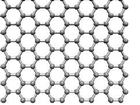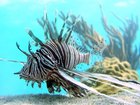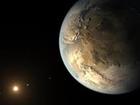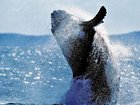Graphene has been touted as a wonder material -- the world's thinnest substance, but super-strong. Now scientists say it is so easy to make you could produce some in your kitchen.
Thus far, graphene has proven elusively hard to manufacture on an industrial scale. Methods have required a choice between high quality graphene in small quantities, or large batches with defects.
 Full Story
Full Story
Few Americans question that smoking causes cancer. But they have more skepticism than confidence in global warming, the age of the Earth and evolution and have the most trouble believing a Big Bang created the universe 13.8 billion years ago, an Associated Press-GfK poll found.
Rather than quizzing scientific knowledge, the survey asked people to rate their confidence in several statements about science and medicine.
 Full Story
Full Story
Research done by U.S. scientists in the Cayman Islands suggests that native predators can be trained to gobble up invasive lionfish that colonize regional reefs and voraciously prey on juvenile marine creatures.
The invasive species with a flowing mane of venomous spines has no natural predators in the Atlantic and Caribbean Sea. Native sharks and groupers typically avoid healthy lionfish, a native to the Indian and Pacific oceans that was likely introduced through the pet trade. But when a University of Florida team tethered spry lionfish to lead weights on reefs off Little Cayman, underwater video cameras late showed nurse sharks and Nassau groupers gulping them down.
 Full Story
Full Story
Pistachios are already a key ingredient in Turkish baklava, but the country may now have found a new way to exploit the nuts known as "green gold" -- by using their shells to heat a new eco-city.
Officials are currently examining plans to build the country's first ecological city with buildings both private and public heated by burning pistachio shells.
 Full Story
Full Story
The discovery of an Earth-sized planet in the "habitable" zone of a distant star, though exciting, is still a long way from pointing to the existence of extraterrestrial life, experts said Friday.
The planet, dubbed Kepler-186f, is the first of this size found orbiting its star at a distance that would allow it to have liquid water -- a prerequisite for the development of life, whether primitive or complex.
 Full Story
Full Story
Private U.S. firm SpaceX launched its unmanned Dragon capsule to the International Space Station on Friday, its third trip carrying supplies and equipment to the orbiting lab.
After three delays, the Falcon 9 rocket and its Dragon capsule finally blasted off as planned at 3:25 pm (1925 GMT) from Cape Canaveral in Florida.
 Full Story
Full Story
Japan has decided to continue its whaling program in the Pacific Ocean, reports said Friday, despite losing a United Nations court case on its other "research" hunt in the Antarctic.
If confirmed, the move will likely spark anger among environmentalists who hailed last month's ruling by the U.N.'s International Court of Justice (ICJ) that Tokyo's hunt in the Southern Ocean was a commercial activity disguised as science.
 Full Story
Full Story
U.S. geologists said Thursday they have uncovered a preglacial tundra landscape preserved for 2.7 million years far below the Greenland ice sheet.
Glaciers are known to scrape everything off any given plot of land -- vegetation, soil and even the top layer of bedrock -- so scientists expressed great surprise that they had found the landscape in pristine condition below two miles (three kilometers) of ice.
 Full Story
Full Story
The hunt for potential life in outer space has taken a step forward -- an international team of researchers has discovered the first Earth-sized planet within the "habitable zone" of another star.
The exoplanet dubbed Kepler-186f was first spotted by scientists using NASA's Kepler telescope, according to research published Thursday in the U.S. journal Science.
 Full Story
Full Story
The extra copy of Chromosome 21 that causes Down's syndrome throws a spanner into the workings of all the other chromosomes as well, said a study published Wednesday that surprised its authors.
Using data from a set of twins, one with Down's and one without, researchers found a major difference in how genes functioned between the two.
 Full Story
Full Story



